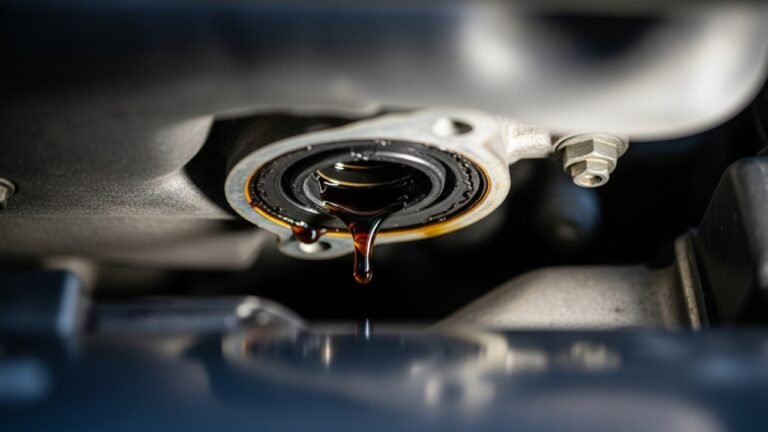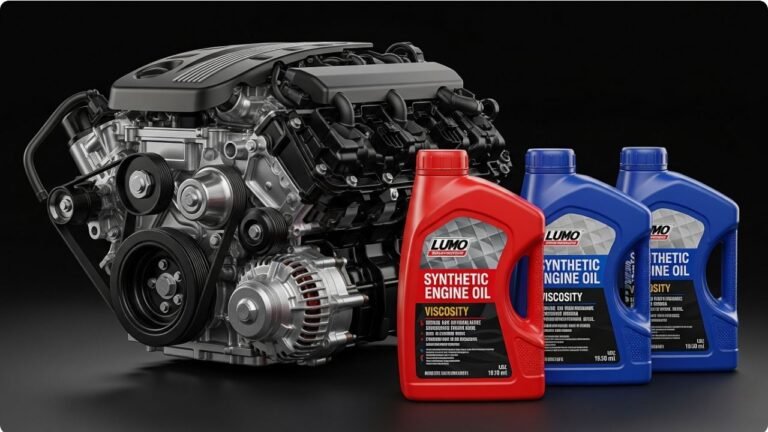Does Oil in a Car Go Bad?

We’ve all been there—looking under the hood and wondering, “Does oil in a car go bad?” I used to think engine oil was like honey. Sticky, eternal, always useful. But just like anything else we rely on, car oil can and does go bad. And when it does, it doesn’t whisper—it shouts through clunky sounds, strange odors, and sluggish performance.
This article will dive deep into how and why engine oil deteriorates, the warning signs you shouldn’t ignore, and tips from both experts and everyday drivers who’ve learned the hard way. Whether you’re someone who only checks oil when the red light flashes or you’re already clocking reminders in your maintenance log, this is for you.
Let’s clear the myths and uncover the science behind your engine’s most important lifeline.
Understanding Engine Oil: More Than Just Lubrication
Many people believe oil’s job is just to grease things up. That’s only half true. Engine oil plays multiple crucial roles in keeping your car running smoothly:
-
Lubrication: Reduces metal-on-metal friction.
-
Cooling: Absorbs and disperses engine heat.
-
Cleaning: Carries away dirt, sludge, and microscopic debris.
-
Sealing: Forms a tight film between piston rings and cylinder walls.
But here’s the catch—oil doesn’t stay fresh forever. Over time, heat, oxygen, moisture, and dirt break down oil’s chemical properties, making it less effective in doing all these jobs.
So yes, car oil can go bad, even if it’s just sitting in your engine or in a bottle on a shelf.
How Long Does Oil Really Last?
You might hear people say, “Change your oil every 3,000 miles,” while others claim, “Modern oil lasts 10,000 miles!” Who’s right?
Actually, both are — depending on the type of oil, driving habits, and vehicle age.
Here’s a breakdown:
| Oil Type | Shelf Life (Unopened) | In-Car Life |
|---|---|---|
| Conventional Oil | Up to 5 years | 3,000–5,000 miles |
| Synthetic Blend Oil | Up to 7 years | 5,000–7,000 miles |
| Full Synthetic Oil | Up to 8 years | 7,000–15,000 miles |
If your car sits in the garage for months, unused, the oil still degrades — just more slowly. So even parked cars need oil changes.
Signs That Your Oil Has Gone Bad
Knowing when engine oil goes bad isn’t always obvious. But your car usually gives you a few hints. Watch for these signs:
-
Dark, dirty oil: Fresh oil is amber and smooth. If it looks black or gritty, it’s done its job — now it’s time to go.
-
Strange engine noises: Clanking, knocking, or rumbling sounds often mean the engine lacks proper lubrication.
-
Burning smell: That sharp, smoky odor? Often a sign oil is overheating or has broken down.
-
Reduced fuel efficiency: Dirty oil makes the engine work harder, burning more fuel.
-
Dashboard warning lights: The infamous oil can symbol doesn’t lie.
Think of old oil like sour milk. You could still use it, but your stomach (or in this case, your engine) is going to suffer.
Does Oil Go Bad Sitting in the Car?
Absolutely — even if you don’t drive much. I had an old Corolla I only drove on weekends. One day, after six months of barely moving it, the engine started making a weird ticking sound. Turns out the oil had settled and partially degraded, forming sludge around key parts.
Why does this happen?
-
Moisture buildup in a non-running engine can mix with the oil.
-
Temperature changes can create condensation.
-
Additives in the oil separate over time when not circulated.
So yes, car oil goes bad even when the car is parked. If you’re not driving regularly, consider changing the oil every six months regardless of mileage.
Can Unused Oil in the Bottle Go Bad?
Yes — even the bottle in your garage isn’t immortal. I once found a bottle of synthetic oil from 2012 and almost used it… until I checked online. Turns out, oil that’s been sitting around for over 5 years (especially in heat or humidity) loses its effectiveness.
Here’s how unopened oil can go bad:
-
Additive separation: Oil formulas contain anti-foaming, detergent, and friction modifiers. Over time, these can break down or settle.
-
Exposure to air: If the seal is compromised, oxidation begins, even without being in an engine.
-
Temperature fluctuations: Heat speeds up oil degradation even in storage.
So before using an old bottle, check the expiry date or manufacture date, and shake it well. If it looks cloudy, smells off, or has particles, don’t use it.
Why Fresh Oil Is So Important
Imagine running a marathon in heavy jeans and boots. That’s your engine with bad oil. It’s working overtime with less efficiency and more risk.
Fresh oil improves:
-
Engine life span
-
Fuel economy
-
Performance
-
Emission levels
And you avoid costly repairs from oil-related damage like engine seizing, turbocharger wear, or gasket failure. Trust me, changing oil every few months is way cheaper than replacing a blown engine.
Real Talk: My Costly Mistake With Bad Oil
Let me tell you a quick story. A few years ago, I skipped an oil change because I was busy and thought, “It’ll be fine.” Fast forward two months, and my check engine light started flashing. The oil had broken down so badly that sludge clogged the oil filter, and the engine nearly overheated.
Repair cost? $1,200.
Lesson? Don’t gamble with expired or neglected oil. It’s not just about the car. It’s about peace of mind every time you hit the road.
The Science Behind Oil Breakdown: What’s Really Going On?
You might wonder, “What exactly makes engine oil go bad?” It’s not magic. It’s chemistry—and some physics, too. Over time, exposure to oxygen, heat, and contaminants causes oil to degrade.
Here’s what happens:
-
Oxidation: Just like fruit left out in the open air, engine oil reacts with oxygen. This chemical reaction forms acids and thickens the oil.
-
Thermal breakdown: High engine temperatures weaken oil molecules, making them less effective at lubricating.
-
Contaminants: Dust, fuel residue, metal particles, and even water sneak into the oil and mess with its purity.
-
Additive depletion: Oil comes with additives to prevent foaming, rust, and sludge. Over time, these additives get used up.
Once all these processes begin, oil slowly loses its protective power, turning from helper to hazard. Think of it like milk turning into yogurt—only your engine won’t thank you for it.
Does Synthetic Oil Go Bad Too?
Yes — even though synthetic oil is more advanced, it isn’t invincible.
Synthetic oils are engineered with uniform molecular structures and enhanced additives. That means they last longer and resist breakdown better than conventional oils. But they still age.
Here’s the deal:
-
In-car synthetic oil can last up to 15,000 miles, but this depends on your driving conditions.
-
Unopened synthetic oil usually lasts 7–8 years if stored correctly.
-
Once opened or used, exposure to air, moisture, and heat begins the slow process of degradation.
If you’re using synthetic oil and think you’re safe forever — think again. Time, moisture, and engine stress still take their toll. Always follow your manufacturer’s recommended change intervals.
Debunking Common Myths About Oil Lifespan
Let’s bust a few myths, shall we? These are common beliefs I’ve heard over the years — and believed myself once.
Myth 1: Oil never expires if you don’t drive.
Even parked cars need fresh oil. Time degrades oil, especially if it sits idle for months.
Myth 2: Synthetic oil doesn’t go bad.
It’s better, yes. But not immortal. Additives still break down, and contamination still happens.
Myth 3: Dark oil means it’s dirty.
Sometimes, yes. But not always. Oil can darken naturally due to heat without being harmful. It’s the texture and smell that matter more.
Myth 4: You can top off old oil with new oil.
You can, but it doesn’t reset the oil’s lifespan. It’s like adding clean water to a dirty fish tank. Doesn’t fix the real problem.
Simple Maintenance Schedule to Keep Oil Fresh
Creating an oil maintenance routine is like brushing your teeth. Small effort, huge payoff. Here’s a basic schedule that works for most cars:
| Task | Frequency |
|---|---|
| Check oil level | Every month |
| Change oil (conventional) | Every 3,000–5,000 mi |
| Change oil (synthetic) | Every 7,500–15,000 mi |
| Change oil (low mileage) | Every 6 months |
| Replace oil filter | With every oil change |
| Inspect for leaks | Every oil check |
Set a reminder on your phone or mark it on your calendar. It’s a small habit that can save you from big bills later.
How Oil Impacts Engine Longevity
People often ask, “Is oil really that important?” Short answer: YES. Long answer? Keep reading.
Engine oil is like your car’s bloodstream. Bad oil clogs arteries, weakens the heart (engine), and shortens its life. Using expired or broken-down oil leads to:
-
Increased engine wear
-
Overheating
-
Sludge buildup
-
Failed gaskets
-
Lower resale value
Modern engines are built to last over 200,000 miles — but only if you take care of the basics. And fresh oil is one of the most important.
FAQs: Does Oil in a Car Go Bad?
Q1: Does oil go bad if I don’t drive my car?
Yes. Even if the engine isn’t running, oil still degrades over time due to moisture and temperature changes.
Q2: How do I know if my oil is expired?
Check the texture, color, and smell. If it’s thick, gritty, dark, or smells burnt — it’s time to change it.
Q3: Can I use oil that’s been sitting in my garage for years?
Not recommended unless it’s unopened, stored well, and less than 5–7 years old. Shake it and inspect before use.
Q4: What happens if I drive with old oil?
Expect reduced performance, engine knocking, higher fuel use, and potentially serious damage over time.
Q5: Is it okay to mix old and new oil?
It’s not ideal. While it might get you through in a pinch, it doesn’t fix the core issue — old oil’s lost chemical strength.
Q6: Does synthetic oil last longer than regular oil?
Yes. It resists heat, breakdown, and oxidation better. But it still needs to be changed eventually.
Q7: Can I trust the oil life monitor in my car?
Mostly, yes — if it’s a newer model. But it’s still wise to check the oil manually and follow your owner’s manual.
Q8: How should I store unused motor oil?
Keep it in a cool, dark place, sealed tightly, and away from direct sunlight or moisture.
Final Thoughts: Treat Oil Like a Health Check-Up
So, does oil in a car go bad? Absolutely. It’s not something you can ignore, delay, or guess your way through.
Your engine depends on oil the way your body depends on blood — it keeps everything moving, clean, and protected. Just like you wouldn’t drink expired milk or skip your doctor visits, don’t push your oil past its limit.
Every oil change is a small act of love for your car. It gives you peace of mind, better performance, and long-term savings. Whether you’re driving to work, heading out on a road trip, or just letting the car sit during winter — remember: check the oil, change it often, and never underestimate its importance.






